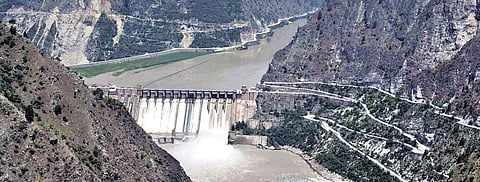

NEW DELHI: Despite Pakistan’s appeals for rethink on the suspension of the Indus Waters Treaty (IWT) 1960, India has chosen to remain silent. Instead, India is proactively bolstering its water storage and canal infrastructure, strategically positioning itself to divert the flow of water from Pakistan’s rivers ahead of any negotiations.
Officials of the Ministry of Jal Shakti and the Ministry of External Affairs have acknowledged that India has received four letters from Pakistan since the IWT was put on hold.
The letters, sent by Pakistan’s water resources secretary Syed Ali Murtaza, articulate the neighbouring country’s desire for revival of the treaty and restoration of the cooperative framework that governs the flow of water resources.
India put the IWT, brokered by the World Bank, on hold a day after 26 people, including one from Nepal, were killed in the April 22 Pahalgam attack.
Pakistan is currently facing a severe water crisis affecting its Kharif crops amid extreme summer heat and India’s regulation of Indus water. Reports indicate that Pakistan also approached the World Bank for intervention, but the organisation declined to intervene.
Instead of responding to the treaty, the Indian government has chosen to enhance its water infrastructure to facilitate water diversion from the Indus basin before engaging in any future negotiations regarding revival of the treaty.
After putting a set of water storage and run-of-river projects on fast track to hold more water, India has launched a pre-feasibility study for the Chenab-Ravi-Beas-Sutlej link canal project. The link canal will feed water to canals in Punjab, Haryana, and Rajasthan, and further link to the proposed Sharda canal.
“India plans to divert over 15-20 million acre-feet of water to meet its agricultural and industrial needs,” said a senior Jal Shakti ministry officer.
When asked why India cannot divert water from the Indus river, he cited reasons such as its geographical constraints.
“Diverting water from the Indus river requires complex and heavy tunnelling across Zaskar and Pir Panjal ranges, which is not economically feasible. But if required, we will do it also as we can implement advanced engineering,” the officer said.
Invoking its national security powers, India has stated that the treaty will stay suspended until Islamabad “credibly and permanently” stops supporting cross-border terrorism. This was approved by the Cabinet Committee on Security. This is the first time New Delhi has put the IWT in abeyance.
‘Indus Waters Treaty will remain suspended’
Invoking its national security powers, India has stated that the treaty will stay suspended until Islamabad “credibly and permanently” stops supporting cross-border terrorism. This was approved by the Cabinet Committee on Security, the highest body on strategic matters.